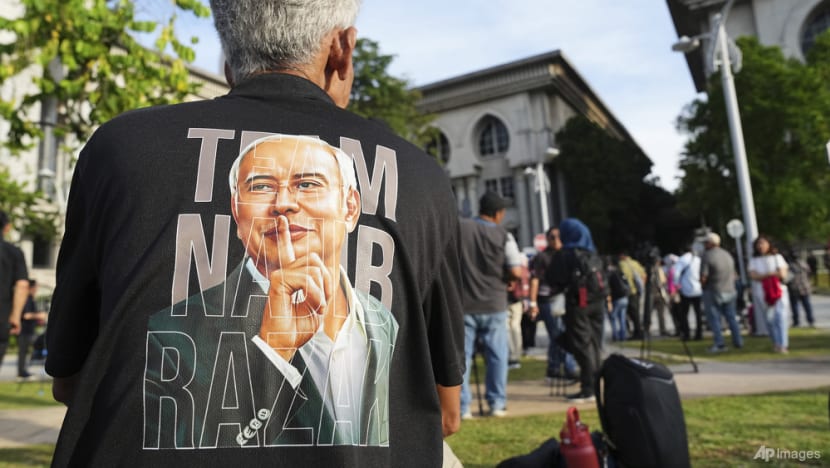Commentary: PAS revealed its cards by supporting Najib. Now it’s paying the price
PAS showed its cards too soon - all in its overzealous pursuit of securing the grand prize of returning to government, says political analyst James Chai.

A supporter of former prime minister Najib Razak waits outside the Court of Appeals, in Putrajaya, Malaysia, on Jan 6, 2025, before Najib won an appeal to pursue his bid to serve his remaining corruption sentence under house arrest. (File Photo: AP/Vincent Thian)

This audio is generated by an AI tool.
KUALA LUMPUR: As former Malaysian prime minister Najib Razak’s house arrest saga drags on, perhaps even UMNO might not have expected to find an ally on the issue surrounding the existence of a supposed royal addendum that could allow him to serve the rest of his jail sentence at home.
On Monday (Jan 6), Najib won an appeal to have his house arrest bid heard at the High Court. This issue is so technical that one would have expected only the most loyal supporters of the former UMNO president to champion it. It was less about Najib’s innocence and more about serving the rest of his already reduced sentence in a more comfortable, albeit highly exceptional, way. In a podcast interview, Najib’s son, Nazifuddin, argued that this ought to be allowed given that Najib is the son of Malaysia’s second prime minister.
It was much less expected that former UMNO ally Parti Islam Se-Malaysia (PAS), which has consistently criticised Najib and the 1MDB scandal, would be the one to come to Najib’s support.
PAS secretary-general Takiyuddin Hassan first raised this issue in May 2024, describing the government’s silence over the royal addendum order as casting a shadow over its integrity. In December 2024, Takiyuddin filed a motion in parliament to debate the existence of the royal addendum.
Towards the end of 2024, PAS issued an internal memo urging its members to support a joint Najib solidarity rally with UMNO outside the Court of Appeal on Jan 6, 2025.
PAS’ overwhelming support for Najib is curious, not least because it’s a clear departure from the party’s previous position on 1MDB, but also because of its past animosity with UMNO.
Granted that there are no permanent enemies in politics, but the way the loose coalition of UMNO and PAS’ Muafakat Nasional ended left a bitter taste, with both parties describing the other’s actions as “betrayal”.
Such mistrust is still simmering under the surface. UMNO leader Nur Jazlan last week called PAS a “political genie” party members should be wary of. On Wednesday, UMNO Supreme Council member Puad Zarkashi accused PAS leaders of “putting on a show”.
WHAT’S BEHIND PAS’ SUPPORT FOR NAJIB?
Initially, PAS’ support for Najib could be seen as another tactical move to split the unity government. The differing views within UMNO, and between UMNO and the other unity government members, presented a good opportunity for the opposition.
By repeatedly raising the issue, to the point of filing a parliamentary motion, PAS could stir up more internal disagreements in government. However, there is a difference between using this issue strategically to split your opponents and actually showing up at a solidarity rally in droves to support Najib. The latter is a potentially risky move that most parties, including PAS’ coalition partner Bersatu, have actively avoided.
With such a move, the potential gains must surely outweigh the costs. The prize of going all-in must be big enough for PAS to pursue. It must be so valuable that PAS would be willing to risk its political position on corruption, its alliance with Bersatu, and even the perception of having backed down in its historical animosity with UMNO.
The chief reason is likely that PAS saw this as an opening to join the government.
PAS, as the largest bloc in parliament with 43 seats, still harbours ambitions of joining the government (rumours of PAS potentially joining the government have persisted for the past two years) and the party is unlikely to overlook any opportunity to do so.
If the royal addendum issue is sufficiently disruptive to the government and a reorganisation is in favour of UMNO and Najib’s faction, then PAS, as the primary backer on the issue, would naturally gain a place, potentially in place of DAP.
Such reorganisation would also help PAS resolve a second quagmire that it has with Bersatu, where internal disputes always seem on the verge of severance. PAS vice-president Ahmad Samsuri Mokhtar’s resignation as the coalition treasurer last month is a telling sign of the current rift.
PAS is no longer willing to accept a second-feeder position in Perikatan Nasional, with Bersatu assuming most critical leadership posts, including the prime ministerial candidate.
PAS’ unilateral decision to support Najib’s solidarity rally, and its pursuit of a higher political prize, is a way for PAS to resolve its internal conflict by selecting another preferred partner.
The wildcard that PAS did not expect, however, was that a royal decree would be issued by the king days before that would prompt UMNO to cancel the Jan 6 rally. UMNO cited the king’s decree on the proper constitutional process, and chose to comply as the party sees itself as a defender of the institution of Malay rulers.
With UMNO backing out, PAS was left alone, but it chose to continue. The irony, of course, is that the rally was never really PAS’ to begin with, and it put the party at risk of being seen as defying the king’s decree.
This is not the first time PAS has been caught in a royal quagmire. In July 2021, former law minister Takiyuddin surprised the country by announcing that the emergency ordinances in place to aid the country's COVID-19 crisis had been revoked. This was done without royal assent, which left the palace “deeply disappointed”.
PAS HAS SHOWN ITS HAND
PAS has put itself in a difficult position. It must stand firm now in support of Najib, even doubling down on another rally, even though it lacks moral and political credibility to champion the issue.
PAS is not welcomed by the main stakeholder in the issue, Barisan Nasional, which has indirectly framed PAS’ involvement as “opportunisitic”. But PAS can ill-afford to backtrack as doing so would not only make it lose face but also be politically costly.
PAS has also lost even more trust with Bersatu by acting unilaterally and contrary to the interests of the coalition. Worst of all, it has shown its archrival, UMNO, that it is interested in working together again, only this time it has surrendered its leverage.
In the end, PAS sacrificed its positions but gained little. It showed its cards too soon - all in its overzealous pursuit of securing the grand prize of returning to government.
James Chai is a political analyst, columnist and the author of Sang Kancil (Penguin Random House).





















